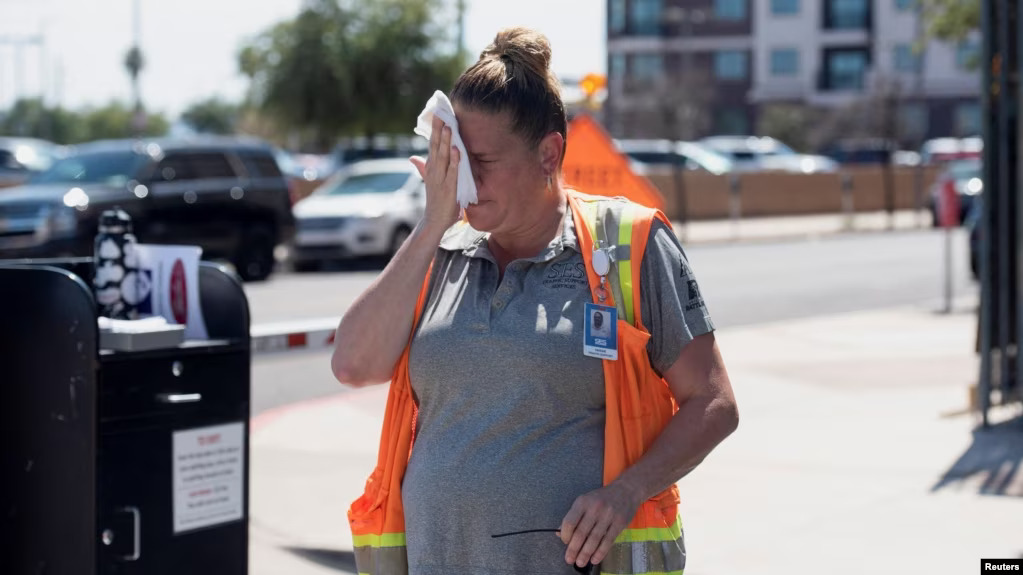Why is it so hot?
It’s not your imagination. The earth is overheating, dangerously.
Why is it so hot, season after season, year after year? Around the world and across the U.S., temperatures are getting warmer. 2023 was the hottest year of temperatures ever recorded across the earth. Across America, communities are facing hotter weather all year long. Hotter temperatures are increasingly threatening our way of life – changing how and when we spend time outdoors, threatening our health and our livelihoods.
How worried should I be about extreme heat?
Extreme heat threatens our lives and the safety of our families and our communities. Extreme heat is defined as extremely high temperatures and humidity for more than a few days. This summer, most Americans faced extreme heat, some of us for months at a time. For example, the city of Phoenix, Arizona hit high temperatures of over 110 degrees Farenheit every single day in July, 2023. The previous record high was 18 days. You may have experienced something similar heat waves where you live.
Human bodies are not meant to live in extreme heat. When it gets too hot, our bodies can lose the ability to control our body temperature through sweating, which is called heatstroke. Heatstroke kills and causes permanent disabilities. Our kids, our grandparents, and physically vulnerable members of our communities are more likely to get heatstroke than healthy adults.
Communities across the country are reacting by opening cooling centers, and giving guidance to people not to go outside during the daytime. Summer camps for children are increasingly held indoors because it is too hot to go outside. People are spending more money on air conditioning, if they are able to afford it. Communities are increasingly considering how to protect outdoor laborers from extreme heat, and farmers are shifting their harvesting to nighttime in order to protect food quality.
Extreme heat also slows down our electric grid, melts our roads and damages other infrastructure that we rely on.
Why is it so hot this year?
It might feel to you like the sun is just more intense than it used to be. But, that’s not what’s happening. Here’s what is happening: when we burn fossil fuels, carbon pollution stays in the atmosphere, acting like a blanket and trapping in heat. Today, there is so much carbon pollution in the atmosphere that it’s causing obvious changes in the weather.
There is near complete consensus on this among climate scientists, with over 99% of scientists agreeing that humans are causing climate change.
And, it will get increasingly hotter until we eliminate pollution. The good news is that if we take steps to reduce our carbon pollution, we can change this trajectory before it’s too late for our kids. We can make fast, safe, clean energy today.
What can I do to help?
There are lots of ways to protect your community from extreme heat, and to end our dependence on dirty energy.
Join CCL to help stop the fossil fuel pollution that is causing extreme heat. You’ll be joined to a local chapter of like-minded individuals who will work in your community to educate people, discuss solutions, and meet with your elected officials to ask them to help fix it.
Climate change is one of the most pressing issues of our time, with far-reaching impacts on the environment, economy, and society. As individuals, our collective efforts hold immense power to drive positive change and address this global temperature crisis. Advocating for climate change action is not just a responsibility but an opportunity to shape a sustainable future for generations to come.
Can we reverse climate change?
No. Climate change caused from carbon pollution is irreversible. But we can protect ourselves from even more damage.
What can I do to help climate change?
We welcome anyone who is serious about joining us as a volunteer for the environment and making an impact towards our environmental conservation efforts. Some of our volunteers take as little as five minutes a month to contact Congress; some dedicate even more time.
Sign up to volunteer
By clicking Sign Up, you are agreeing to our terms of service and privacy policy. You can unsubscribe at any time.


